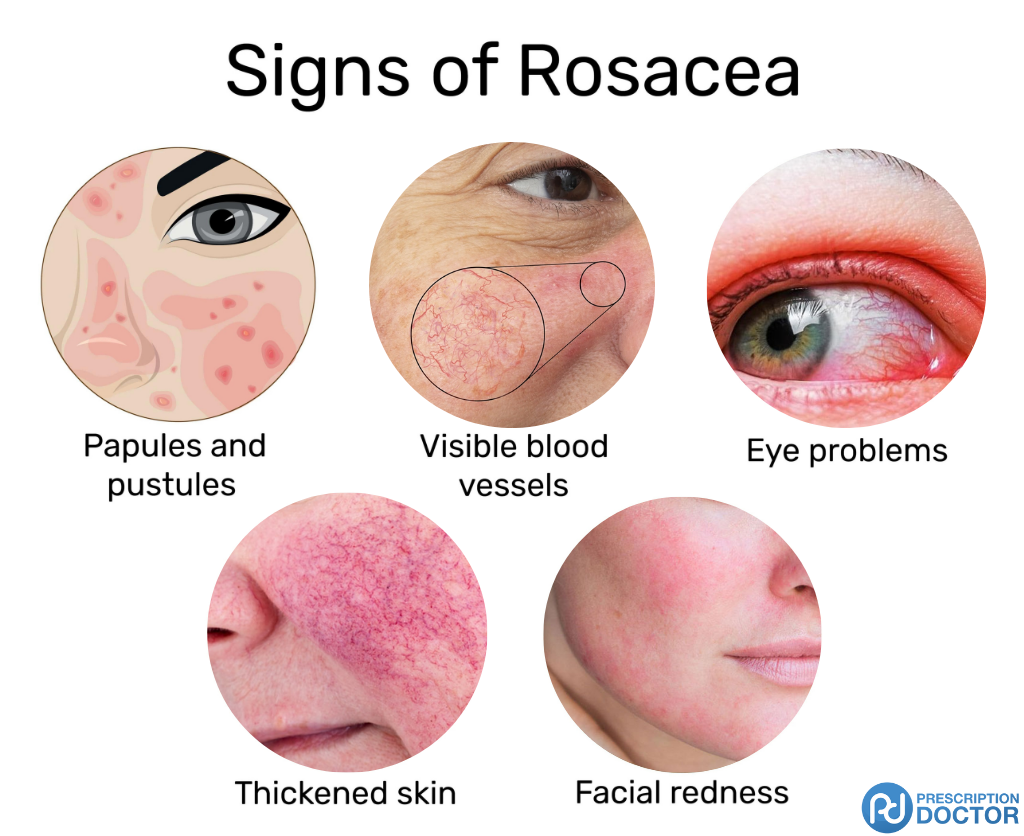How to Get Rid of Rosacea Permanently
Rosacea is a long-term skin condition characterised by facial redness, swelling, flushing, raised red-coloured spots (papules or plaques), and skin thickening.
Minor features also include skin burning, stinging sensations, and dryness. It predominantly affects the central facial region, including the cheeks, nose, chin, and forehead. Ocular rosacea is a subtype of rosacea that causes eye discomfort, irritation, itching, and foreign body sensations.
Unfortunately, there is no permanent cure for rosacea; however, long-term treatment can help alleviate these symptoms, and preventive measures can reduce the likelihood of relapse.
Symptoms and Causes
Rosacea presents with a range of symptoms, including the following:
- Persistent facial redness, which usually gets severe after triggering factors.
- Facial flushing is characterised by heat, burning sensations, and pain.
- Papules, pustules, or plaques, characterised by raised red-coloured spots.
- Skin inflammation.
- Visible blood vessels due to dilatation of blood vessels in response to inflammation (known as telangiectasia).
- Burning sensations, skin dryness, itching, and facial swelling.

Although the exact cause of rosacea remains unknown, several risk factors have been identified as contributing to its development. These factors include prolonged sun or ultraviolet (UV) light exposure, spicy foods, alcohol, strenuous exercise, stress, exposure to intense heat or cold, menopause, caffeine, and hot drinks. Moreover, a family history of rosacea and certain medications, such as amiodarone, steroids, and high doses of vitamin B6 and B12, increase the risk for rosacea.
How is it Different from Acne Vulgaris?
Although rosacea and acne vulgaris share many symptoms, there are distinct differences between the two conditions. Acne vulgaris appears as whiteheads and blackheads (comedones), while rosacea presents with persistent facial redness.
Professional Treatment Options Provided by Prescription Doctor
It is a long-term condition that may improve with treatment; however, intermittent relapses may appear.
The following treatment regimens are mainly considered for rosacea.
Rozex Cream and Gel: It contains metronidazole (an antibiotic) recommended for treating inflammatory lesions (i.e., papules and pimples) of rosacea. It is used topically, i.e., directly applied to the affected skin.
Finacea Gel: It contains Azelaic acid that kills rosacea-causing bacteria and is recommended for mild-to-moderate rosacea.
Oral doxycycline 40mg (Efracea) once daily, along with topical Ivermectin, is prescribed for moderate to severe disease. It provides long-term remission by killing the bacteria that cause rosacea.
Metrogel: Metrogel, just like Rozex, contains topical metronidazole that helps treat rosacea and associated pimples and bumps.
Topical Ivermectin (Soolantra), administered once daily for three to four months, is typically prescribed for rosacea with mild to moderate papules or pustules.
What if These Treatments Fail?
If rosacea symptoms do not improve despite the above treatment, your GP may refer you to a dermatologist for further evaluation. In such cases, a skin specialist usually prescribes oral isotretinoin at low doses. Isotretinoin is a vitamin A derivative, typically prescribed for severe acne and rosacea.
Similarly, a dermatologist may also prescribe clonidine and beta-blockers (to reduce skin redness). In severe cases, your dermatologist may also consider laser and intense pulsed light (IPL) treatment to improve skin flushing. IPL uses narrow beams of light to shrink visible blood vessels, with minimal damage to the other unaffected facial areas.
Self-Help Measures
The following self-help steps can help reduce symptoms' severity and relapse chances:
- Avoid triggering factors and make a diary to identify the exact ones that exacerbate your rosacea. It is also essential to deal with these triggering factors accordingly; for example, if stress is the primary trigger, you can practice stress-reducing activities.
- Apply high-factor sunscreen that protects against ultraviolet A and B.
- Ultraviolet protection glasses are usually recommended for ocular rosacea. Furthermore, artificial tears can decrease ocular burning and dryness.
- Non-oily emollients can reduce the dryness associated with rosacea. Moreover, soap-free, gentle cleansers are recommended for washing the skin.
Frequently Asked Questions (FAQs)
Is there any permanent cure for rosacea?
Unfortunately, there is no permanent cure for rosacea. It is a remitting-relapsing disease, which means it may go into remission for years, and then the symptoms may reappear. Following the treatment and self-help measures, rosacea may remain in remission for prolonged periods.
What is rhinophyma? Is it related to rosacea?
Rhinophyma refers to the swelling of the nose in rosacea, which leads to scar formation and a change in its shape. It usually develops when rosacea remains active for many years. Dermabrasion (the removal of the upper layers of skin using a burr or wire brush) and electrosurgery are the primary treatment options for rhinophyma.
What if rosacea is left untreated?
Rosacea can cause many negative psychological impacts, including anxiety, depression, and low self-esteem. Rosacea can also lead to severe skin scarring if left untreated.
Similarly, ocular rosacea can also lead to several eye-related complications, such as conjunctivitis (inflammation of the inner surface of the eyelids), blepharitis (inflammation of the eyelid margins), and keratitis (inflammation of the cornea).
Is there any skin camouflage for rosacea?
Special camouflage makeup, featuring yellow or green-tinted cosmetics, can visually mask the skin's redness and flushing.
Additional Resources
Sources
NHS inform 2023. Treating Rosacea
National Institute for Health and Care Excellence (NICE) 2024. Scenario: Rosacea
British Association of Dermatologists 2018. Rhinophyma
National Institute for Health and Care Excellence (NICE) 2024. Rosacea - acne: Summary
Authored By

Dr Giuseppe Aragona
DoctorPublished on: 19/06/2023
Reviewed By

Mohamed Imran Lakhi
MPharm - Lead PharmacistReviewed on: 05/06/2025
© 2013 - 2025 Al Muhsineen Limited. All Rights Reserved. Registered Pharmacy: 34 Halliwell Road, Bolton BL1 8RL. Registered Office: 254 First Floor, Shearbrow, Blackburn, England, BB1 8DS





